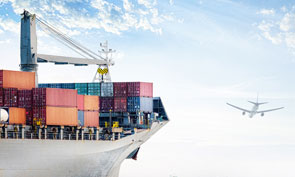
The global pharmaceuticals logistics market was valued at $64 billion by IATA in 2017* and is one of the most heavily regulated and expensive in the world. What’s more, it is predicted to rise to $100 billion by 2020 with demand growing fast from emerging markets with ageing populations who will soon account for 50% of the global pharmaceutical usage.
Air transport has long been the pharmaceutical industry’s preferred mode of international transport thanks to its unrivalled speed and flexibility. However, a growing number of major players are looking to the oceans for a more attractive solution. With air freight costing four times more than surface shipping, the economic argument is compelling, especially with regulatory health bodies forcing suppliers to drive down costs. Moreover there are growing pressures for companies to pursue more sustainable practices; air cargo has a carbon footprint 25 times larger than seaborne freight; new shipping routes are emerging (ironically predominantly due to climate change); and so the case for ocean transport becomes watertight.
While a short shelf life rules out the option of sea transport for some pharmaceuticals, most are suitable for longer transit times. What’s more, the development of more streamlined digitized systems, offering greater flexibility and speed, is accelerating the shift from air to sea. In fact, 3.5 billion tons of pharmaceuticals are now carried by sea every year and key players like Bayer, Pfizer and GlaxoSmithKline are all looking to further increase the proportion of freight travelling by ship. Astra Zeneca have led the way, increasing the amount they send by sea from 5% in 2012 to 70% in 2017. Key to achieving this transformation, is the ability to reduce risks and protect high-value cargo in transit.
The forces and climatic effects affecting sea cargo are different from those encountered in the air. Pharmaceuticals are particularly sensitive to the range of climatic stresses associated with sea cargo such as moisture damage as a result of condensation. Delicate and fragile cargo needs a range of protection measures at every stage of the supply chain. And so, it is vital to work with an expert partner who understands the stresses that will be placed upon your cargo.
It also requires all of your logistics teams to be fully informed about regulatory requirements and to confidently manage changes to supply chain routes and modalities.
In a recent interview, Alan Kennedy - Executive Director of the pharmaceutical ocean freight network Poseidon, revealed that they had undertaken a successful trial transporting high value pharmaceuticals via sea. However, he was quick to point out that key to making this transition, was a total commitment to best practice.
Cordstrap’s global network means we are uniquely placed to help you do that. Our market-leading container protection solutions can be easily applied to refrigerated containers to protect temperature-sensitive pharmaceutical shipments. All our solutions are fully CTU Code compliant and have full accreditation from the International Maritime Organization, Germanischer Lloyd, Mariterm AB and the American Association of Railroads (AAR).
*Source: https://www.iata.org/pressroom/pr/Pages/2017-12-05-01.aspx
For expert advice on cargo securing solutions contact us now
Contact nowCordstrap have specialists in over 50 global locations
Providing physical insurance to the world’s major industries
Delivering cargo protection solutions